April 13, 2025 | 17:58 GMT +7
April 13, 2025 | 17:58 GMT +7
Hotline: 0913.378.918
April 13, 2025 | 17:58 GMT +7
Hotline: 0913.378.918
The Research Institute of Aquaculture III (Institute III) is making great efforts to contribute to the successful implementation of the marine aquaculture development strategy.
Scientists at Nha Trang Marine Aquaculture Research and Development Center, under Institute III, located in Phuoc Dong Commune, Nha Trang City, Khanh Hoa province are constantly researching to produce valuable seeds for the development of marine aquaculture.
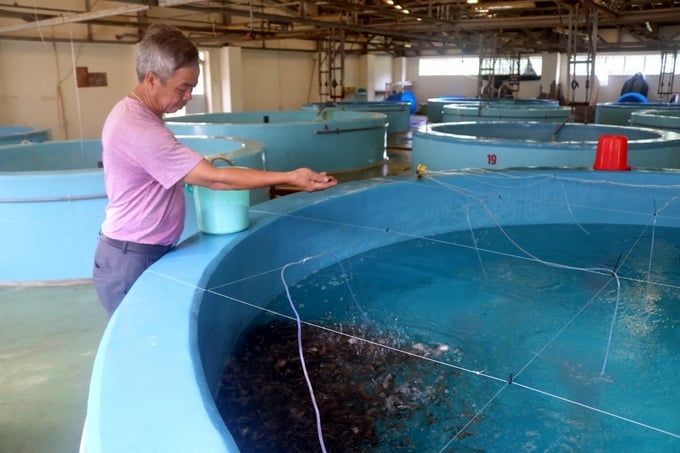
Nha Trang Marine Aquaculture Research and Development Center has mastered the technology of producing various aquatic seeds for marine aquaculture. Photo: KS.
Many aquatic species of great economic value are being researched to put into seed production and commercial farming including grouper, tiger grouper, flat grouper, sea bass, sea cucumber, cap shrimp, lobster among many otthers. Institute III have mastered the technology of seed production and commercial farming for many of these species.
Dr. Truong Quoc Thai, Director of Nha Trang Marine Aquaculture Research and Development Center, said that: “Over the past 5 years, Institute III has implemented and mastered the seed production technology for many potential aquatic species to aid in the development of marine aquaculture. The most notable of which is the sea bass. Sea bass is considered to be among 10 types of marine fish with high economic value, white meat and a delicious taste.
The quality of the seed plays a significant role in developing sea bass farming strongly and sustainably. In reality, the quality of sea bass seed is currently unstable, as demonstrated by indicators such as: slow growth, high rate of malformation, and presence of diseases that affect the efficiency of farming. To combat such difficulties, Institute III has been implementing a program to select sea bass varieties, with the aim to create a school of fish with fast growth rate.
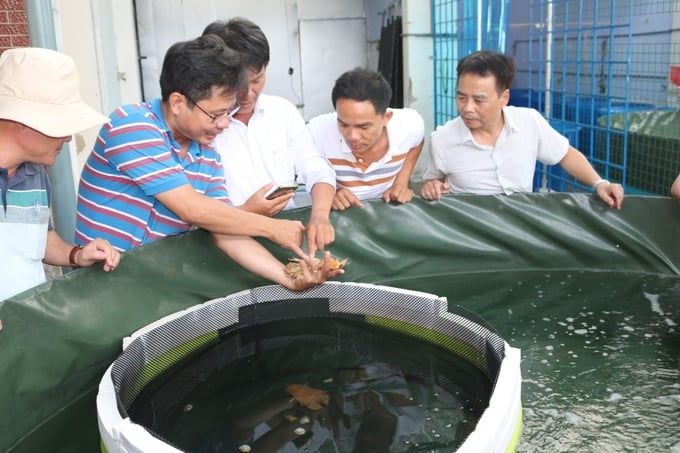
Scientists at Institute III are making efforts to research aquatic seed production. Photo: KS.
“We have selected to create G2 broodstock and are producing and rearing schools of sea bass with G3 varieties. On the other hand, we are conducting assessment of VNN (neuronecrosis disease) clearance on the selected sea bass species", said Mr. Thai.
In addition to sea bass, many species of grouper with high economic value are also being researched and mastered by Institute III in terms of seed production and commercial farming. The most notable technology is the production of the pearl grouper, this is a cross between the turmeric grouper and the tiger grouper. This hybrid generation possesses many outstanding characteristics from the parent fish such as fast growth, delicious meat and strong resistance to environmental changes and diseases.
Institute III has transferred the technology of producing pearl grouper to 5 units in Khanh Hoa province and provided training for many farmers in Cam Ranh city and Ninh Hoa town. The project for red grouper (or star grouper) is currently in progress, and scientists at Institute III have successfully produced this seed.
According to Dr. Truong Quoc Thai, red grouper has potential for offshore marine aquaculture. Regarding grouper, Institute III is continuing to research to perfect the seed production technology in the immediate future. In addition to the aforementioned marine fish varieties, Institute III is also continuing to research and produce other marine fish varieties of high economic value such as the meniscus (classified as rare in the Red Book), silver chisels, and crayfish, etc.
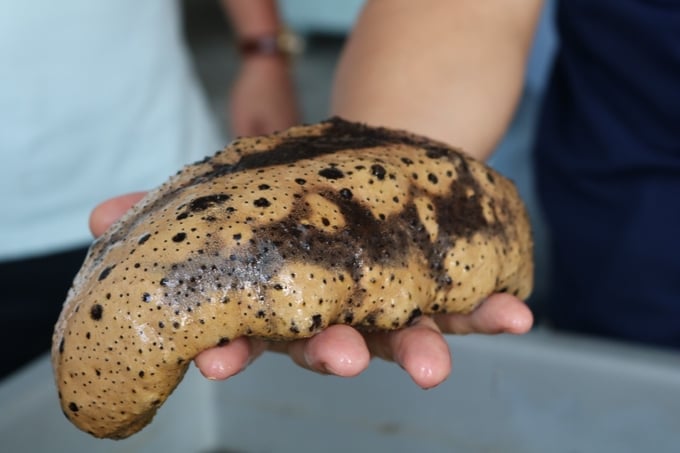
Breast sea cucumber. Photo: KS.
In addition to marine fish, Institute III has succeeded in researching seed production for several other species such as sand sea cucumber, breast sea cucumber, king crab, cap shrimp, etc., in order to contribute to the diversity of aquaculture. Furthermore, lobsters are the main target of shrimp farming in the South Central region, and they are currently being researched by scientists at Institute III with extremely positive results, aiming for successful seed production in the near future.
Commenting on the strategy of research, application and technology transfer in seed production for marine aquaculture, Assoc. Prof. Dr. Vo Van Nha, Deputy Director of the Research Institute of Aquaculture III, said that, the Institute focuses on producing potential species in the South Central region, with emphasis on marine fish species. Additionally, the Institute will also focus on perfecting and stabilizing seed production technologies, improving the quality of marine species with high economic value, in order to meet market demand.

Institute III is conducting research on lobster species to aim for successful seed production in the near future. Photo: KS.
Regarding the proposal for the main species of marine aquaculture for Khanh Hoa province as well as the South Central region, Assoc. Prof. Dr. Vo Van Nha suggested the group of concentrated marine species such as sea bass, pompano, fish mu. There are also two potential aquaculture species in the future such as Barrier travelly and Golden trevally.
As for lobsters, the Institute will primarily focus on raising blue lobsters, followed by cotton lobsters. For the mollusk group in the area, the Institute will focus on raising oysters and clams. The seaweed group will include focus on grape seaweed, jam seaweed, and cartilage seaweed.
"Our proposed subjects will participate in the seed chain for marine aquaculturein the South Central region", Dr. Nha affirmed.
According to Assoc. Prof. Dr. Vo Van Nha, seed is the first key factor in determining the success of marine aquaculture. As a result, seed production needs to be properly invested, upgraded, and the technology must be improved in order to produce better quality seed. He said that Khanh Hoa province is house to many institutes and universities, accompanied by favorable natural conditions, so the profession of producing aquatic seeds for marine aquaculture can thrive.
Translated by Nguyen Hai Long
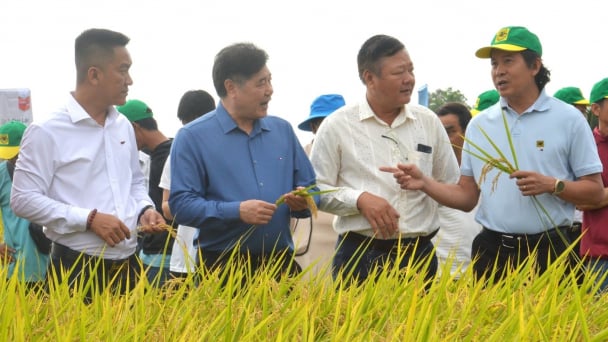
(VAN) The results from pilot fields are catalyzing the expansion of the One million hectares of high-quality, low-emission rice project in Kien Giang.
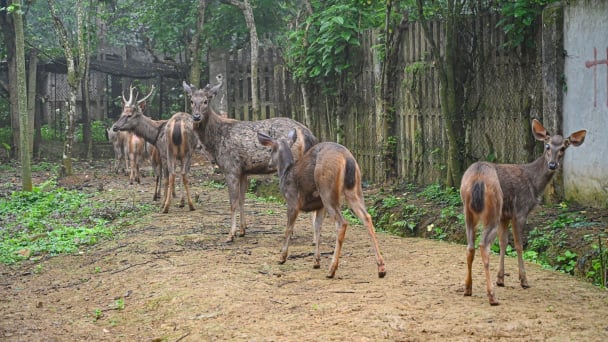
(VAN) On the morning of April 11, Cuc Phuong National Park received 18 individuals of endangered and rare wild animals from Da Nang city.
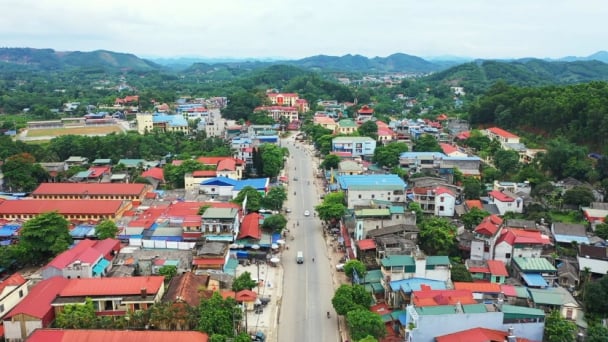
(VAN) FAO supports Vietnam in enhancing survey sampling techniques for the 2025 nationwide agricultural and rural census.
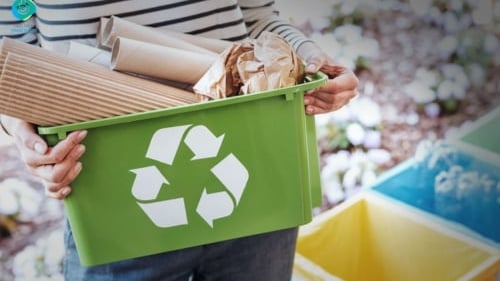
(VAN) By participating in the green transition, manufacturers become an indispensable part of the circular economy, contributing to resource optimization and environmental protection.
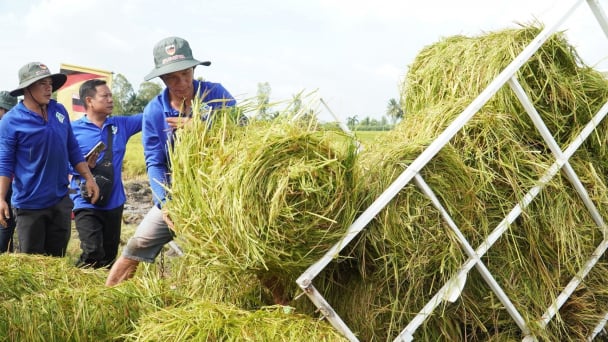
(VAN) The One Million Hectares of High-Quality and Low-Emission Rice Program can generate nearly 14 million tons of straw annually, posing an urgent requirement to diversify straw-based products.
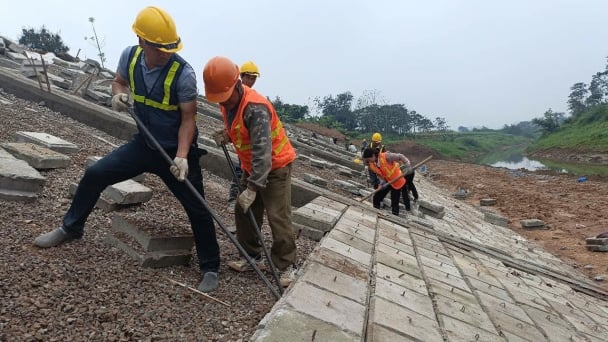
(VAN) This figure was recently announced at a conference held in Yen Bai, focusing on climate-resilient infrastructure development for ethnic minority regions.
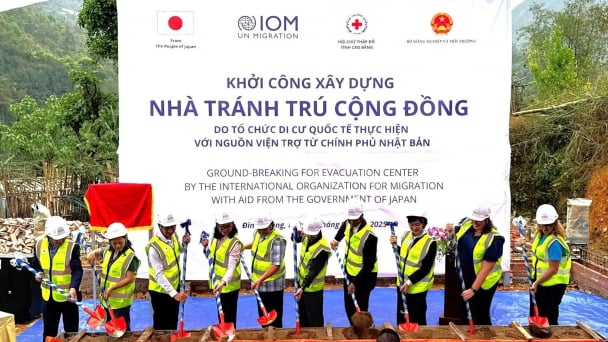
(VAN) The evacuation center is a practical work in efforts to respond to natural disasters and adapt to climate change in vulnerable areas.